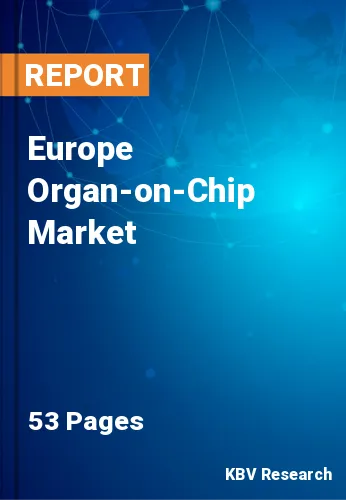The Europe Organ-on-Chip Market would witness market growth of 29.6% CAGR during the forecast period (2022-2028).
The convergence of labs-on-chips (LOCs) with cell biology has enabled the study of human physiology within an organ-specific setting, hence establishing a unique model of multicellular human organisms in vitro. Perhaps, one day, the use of animals in drug development and toxicity testing would be eliminated. Multiple publications assert that organ functions have been mapped onto this interface, however, this microfluidic application is still in its early stage.
The design and methodology of organs-on-chips will vary between different researchers. Therefore, the process of validating and optimizing these systems would likely be lengthy. Microfluidic devices have replicated a variety of organs, including the brain, heart, lung, kidney, liver, prostate, artery, skin, bone, and cartilage. In spite of this, creating viable artificial organs needs not just precise cellular manipulation, but also a thorough comprehension of the human body's fundamentally complex response to any event.
During testing, the isolation of organs is a common concern with organs-on-chips. The body is a complicated network of physiological processes, making it tough to imitate a single organ. Microfabrication, microelectronics, and microfluidics offer the possibility of properly simulating complex in vitro physiological reactions. The invention of organ chips has made it possible to examine the intricate pathophysiology of human viral infections. The liver chip platform, for instance, has enabled research into viral hepatitis.
European countries possess highly advanced healthcare and pharmaceutical industries. According to the International Trade Administration, Germany has the third largest market for medical technology in the world, and is by far the largest market in Europe, with twice the size of the market in France and three times that of Italy, the United Kingdom, and Spain. The German market for medical devices is one of the most lucrative in the world, accounting for around 25.6% of the overall European market.
The Germany market dominated the Europe Organ-on-Chip Market by Country in 2021; thereby, achieving a market value of $55,115.3 Thousands by 2028. The UK market is exhibiting a CAGR of 28.6% during (2022 - 2028). Additionally, The France market would experience a CAGR of 30.6% during (2022 - 2028).
Based on Type, the market is segmented into Lung on chip, Heart on chip, Human on chip, Kidney on chip, Liver on chip, and Intestine on chip. Based on countries, the market is segmented into Germany, UK, France, Russia, Spain, Italy, and Rest of Europe.
Free Valuable Insights: The Global Organ-on-Chip Market will Hit $815.6 Million by 2028, at a CAGR of 30.2%
The market research report covers the analysis of key stake holders of the market. Key companies profiled in the report include AxoSim, Inc., Visikol, Inc., CN Bio Innovations Limited., Elveflow (Elvesys Group), Emulate, Inc., Insphero AG, Mimetas B.V., Nortis Inc., Organovo Holdings, Inc. and TARA Biosystems, Inc.
By Type
By Country
Our team of dedicated experts can provide you with attractive expansion opportunities for your business.

